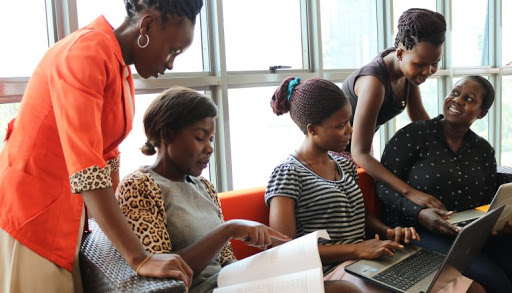
Women’s NGO urges gov’t to ensure unfetered access to the internet by women

Derrick Kiyonga
Government has been implored to ensure that the policy framework related to the internet factors in women’s unique perspectives and views in an effort to produce a robust law that is gender-sensitive.
In its report entitled “Bridging the Digital Gender Gap in Uganda: An Assessment of Women’s Rights Online Based on the Principles of the African Declaration of Internet Rights and Freedoms”, Women of Uganda Network (WOUGNET) a non-governmental organization tried to weigh how Uganda is performing in as far as women’s usage of the internet is concerned.
It matched this performance against the principles of the African Declaration of Internet Rights and Freedoms (AFDEC) – which was drafted by African civil society organizations to guide the creation of a positive, rights-based and democratically governed Internet policy environment on the continent.
AFDEC has 13 principles that include; Openness; Internet Access and Affordability; Freedom of Expression; Right to Information; Freedom of Assembly and Association on the Internet; Cultural and Linguistic Diversity; Right to Development and Access to Knowledge; Privacy and Personal Data Protection; Security, Stability, and Resilience of the Internet; Marginalized Groups at Risk; Due Process; Democratic Multi-stakeholder Internet Governance; and Gender Equity.
Internet access and affordability
The AFDEC principle on access and Affordability states that; “Access to the Internet should be available and affordable to all persons in Africa without discrimination on any ground such as race, colour, sex, language, religion, political or other opinion, national or social origin, property, birth or other status.”
In Uganda, the WOUGNET report says that despite the increase in access to and use of the internet and ICTs across the board, access and affordability is still a challenge for large sections of the population especially the poor, rural populations, women, and persons with disabilities.
To prove gender disparities as far as internet access is concerned, WOUGNET cites the 2015 Uganda Communications Commission (UCC) survey titled “Access and usage of ICT” which found that only 44 percent of women owned and could use a phone at any time compared to 62 percent of the men.
Furthermore, the same UCC survey found that only 15 percent of women had used a computer or the internet in the last three months prior to the survey compared to 21 percent of the men that were interviewed.
Compared to the other cities, WOUGNET cites a 2016 survey by the World Wide Web Foundation which revealed that Kampala has the largest gender gap in Internet access with only 21 percent of women reported having used the Internet, versus 61 percent of men.
“This is because while internet access has become more affordable, particularly on mobile phones, costs are still expensive for many Ugandans, especially the women who have no significant sources of income,” the report saying citing figures from the 2014 Uganda National Population and Housing survey that indicate that 32 percent of women were not involved in any economic activities, compared to only 26 percent of the men.
Beyond having access to and affording the costs of the internet, utilization of these digital technologies requires the right skills, knowledge and tools, the report says.
Unfortunately, according to WOUGNET majority of women also lack the skills and confidence to engage with digital technologies effectively at every level, starting from basic usage.
Again it cites a World Wide Web Foundation report which disclosed that a third of women surveyed in poor areas in Kampala, say the lack of digital know-how stops them from using the Internet.
“In Uganda, there are high illiteracy levels among women, which impedes their access to and use of digital technologies. The 2014 shows that literacy levels among females was lower at, 68 percent compared to that of males, which stood at 77 percent,” the 11- paged-report says.
Security, Stability and Resilience of the Internet
The AFDEC Principle on security, stability and resilience emphasizes that; “Everyone has the right to benefit from security, stability and resilience of the Internet. And that unlawful surveillance, monitoring and interception of users’ online communications by state or non-state actors fundamentally undermine the security and trustworthiness of the Internet.”
Unfortunately, WOUGNET notes that the growth of the internet and other digital technologies has raised new human rights and safety concerns.
Cyberbullying, online harassment and cyberstalking have become too common, as part of a wider variety of violent behaviors that occur in digital spaces and disproportionately affect women and girls.
In many countries, women have experienced online abuse – from petty harassment and trolling to stalking and sexual intimidation.
In Uganda, the number of women whose nude pictures or videos have been shared online without their consent has been increasing over the years the report says.
“In the last five year, up to at least 8 Ugandan celebrities, including Judith Heard, Fabiola Anita, Martha Kagimba popularly known as Martha Kay, Cindy Sanyu, Sanyu Robina Mweruka, Desire Luzinda, Zari Hassan, and herbalist Sylvia Namutebi popularly known as Maama Fina have fallen victims to this behavior, allegedly by their ex-boyfriends or people out to blackmail the victims for money.”

According to the 2016 Web Foundation survey, a shocking 45 percent of female Internet users in Kampala reported having experienced online threats.
While section 13(1) of the Anti-Pornography Act criminalizes the production, trafficking in, publication, broadcasting, procuring, importing, exporting, selling or abetting any form of pornography, only in one case have other individuals (outside the victim) been charged for cybercrime related to the leaking of the nude pictures and videos.
Last year, Herbert Arinaitwe alias John Paul, 27, a business man in Rubaga division and Farid Mukiibi, 34, were charged at Buganda Road Chief Magistrate’s Court by Chief Magistrate Miriam Okello with aggravated robbery and cyber-crime in connection to leaking nude photos of socialite Kagimba.
Todate, the two men, are yet to know their fate.
“The impact of these cyberbullying and harassment is further compounded by the fact that authorities are always on hand to arrest and or seek to prosecute the victims,” notes the WOUGNET report adding that in 2019 socialite Heard told the BBC how she was arrested by police and shamed for the leaked nudes.
Privacy and Personal Data Protection
One of the biggest human rights concerns in this digital age has been unlimited ability and the massive collection and preservation of biometric data.
The growth in mobile subscriptions, increased use of smartphones, mandatory SIM card registration according to WOUGNET have resulted in increased collection, processing and sharing of personal data making it increasingly prone to abuse by both state and non-state actors.
Unfortunately, many internet users are not aware of the implications of their use of the web and how their rights are compromised by their internet usage or how their data is automatically gathered or processed without their knowledge and sold or linked with other sources to produce a complex record of several aspects of their lives.
The AFDEC principle on Privacy and Data Protection requires that “Personal data or information shall only be collected and/or processed by states and non-state actors such as access providers, mail providers, hosts, and other intermediaries, in compliance with well-established data protection principles.
Uganda moved a step closer towards ensuring that data is protected that data within her boundaries is protected when in 2019 President Museveni assented to the Data Protection Act, 2019.
The Law applies to the collection, processing, holding or using of personal data within Uganda in respect to persons in or outside Uganda, in respect to Ugandan citizens.
This means that both automated and physical data collection, processing and storage is covered within the scope of the Act.
But this hasn’t stopped individuals from abusing women’s personal data, mostly pictures and video in the process compromising their right to privacy and data protection.
“Most of the personal data are obtained and shared without the consent of the victims in acts of revenge porn or blackmail in order to extort money from the victims, amounting to cyber harassment and stalking,” the report says.
In order to bridge the digital gender gap, WOUGNET says, that government leaders, and all other relevant stakeholders must get to understand the barriers to access and develop the public policies, tools and interventions that promote more gender inclusivity
The post Women’s NGO urges gov’t to ensure unfetered access to the internet by women appeared first on Nile Post.
0 Response to "Women’s NGO urges gov’t to ensure unfetered access to the internet by women"
Post a Comment